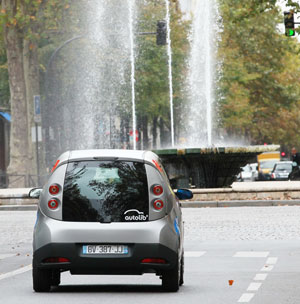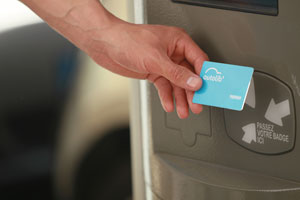PARIS — Feb. 12, 2013 — Paris is known for its broad boulevards, its picturesque side streets and its heavy traffic. Autolib’, an innovative car-sharing service, is helping make the traffic more manageable through a fleet of compact electric cars and an array of flexible services designed to help drivers reduce their reliance on privately owned cars — all connected and managed through an intelligent system based on Microsoft technology in the cars and at the points of registration, rental and service.

The city government, in collaboration with 46 surrounding municipalities, established requirements for a car-sharing service that would serve the more than 1 million people who drive into or through Paris each day and offer flexibility for the majority of Parisians who do not own cars. In February 2011, the cities selected the Bollore Group to design and develop the service. Bollore was already marketing the Bluecar, a four-person electric vehicle built around a powerful lithium metal polymer battery designed by the company; IER, a subsidiary of the Bollore Group, was given the task of designing and creating the technology and infrastructure for a car-sharing service that would make the Bluecar available to Autolib’ members.
The technology for the Autolib’ program consists of five major elements, including three kinds of kiosk for registration, rental and vehicle charging; an in-car system for driver access, navigation and customer assistance; and Ambassador handhelds to monitor vehicle location, charging levels and maintenance.
- Registration kiosk. Seventy freestanding enclosed kiosks located throughout Paris and its suburbs enable new users to join the program within minutes. The kiosks, which run Windows Embedded POSReady, enable registrants to scan a credit card and valid driver’s license, connect to a customer service agent via videoconference, and within minutes receive an RFID-enabled membership card that grants access to the 1,750 Bluecars in the Autolib’ fleet. More than 60,000 subscribers have enrolled in plans ranging from one day to one week, month or year.
- Rental kiosk. Autolib’ members check in with a membership card and use the Windows Embedded POSReady-based touch-screen system to reserve the most fully charged car near their location — which may be right next to the kiosk or a short distance away if no car is available at the nearest station. The kiosk provides a map and directions; if the nearest station is empty, the kiosk shows the closest stations at which a car may be reserved, or lets members connect to a customer service agent if additional assistance is needed.
- Charging station. There are 1,750 electric cars available at 750 charging stations throughout Paris and its surrounding suburbs; each station has parking spaces for four to six cars. Display lights at each charging station indicate if a car is available (green), reserved (blue) or unavailable for technical reasons (red). Waving an Autolib’ membership card at the driver’s door unlocks the car and the cap to the charging cable. The driver can then disconnect and stow the charging cable, start the car, and drive away.
- In-car system. The Autolib’ in-car system, running Windows Embedded Standard, greets the driver by name upon arrival and sets the temperature and radio station in accordance with the driver’s saved preferences identified during the registration process. The driver can access GPS navigation via touch screen or be connected to a customer service agent to find a parking place or report any problems.
- Centralized Autolib’ data management system. A team of 400 mobile ambassadors, using Ambassador handheld devices running Windows Embedded Handheld to connect to the Autolib’ data system, circulates through the region to inspect and repair cars and assist members who are involved in accidents. Cars and kiosks are connected to a management system that incorporates Windows Server and SQL Server with proprietary software, enabling ambassadors to monitor car locations and charging levels in real time so that they can locate drivers who need assistance or move charged cars to locations where they are needed. The system also enables software and firmware maintenance and updates.
A key feature of the Autolib’ service is the ability to rent a car for a one-way trip, picking it up from one charging station and leaving it at another — ideal for drivers who want to connect to a bus or train line to continue their journey, or to drive to a social gathering and then take a taxi home. The one-way trip is particularly important for drivers going from suburb to suburb, where there are fewer public transportation connections than from suburb to city center.

“Another problem in Paris is that there are not enough parking spaces for all the cars that are there,” says Vanessa Colombier, Autolib’ spokesperson. Colombier estimates that more than 1.2 million trips have been completed in the all-electric cars, journeys that would have produced 1,500 metric tons of CO2 emissions if conventional combustion-engine cars had been used.
“It is estimated that 5 percent to 10 percent of the traffic in the capital is generated by people looking for a space — creating a lot of unnecessary emissions,” says Colombier. The Autolib’ Bluecars can be parked in any of the 750 dedicated stations and 3,900 charging points.
In addition, Autolib’ can be less expensive than car ownership for members who only make occasional car trips, with a one-year membership costing just 144 euros plus a modest hourly use rate, as compared with the 5,000 euros that car registration, ownership and use would cost a typical Parisian each year. And in neighborhoods where a taxi might be hard to find late in the evening, a driver can find an Autolib’ rental kiosk and car station within 200 meters of any location.
“We really started this project from zero,” says Christophe Arnaud, vice president of marketing and director of business development for IER. “In seven months we had to make everything: the charging infrastructure, the system in the cars, the monitoring and information systems. Everything was new.”
The program is attracting international attention; Arnaud says officials from all over the world have come to Paris to see the Autolib’ cars and kiosks for themselves and to learn more about how they might create similar programs in their own cities. Autolib’ also continues to develop the service, with plans for enhanced in-car music playback capabilities, pop-up applications that can offer drivers discounts or location-based promotions, or other real-time connectivity and personalized services.
“Paris is changing quickly nowadays, with a dynamic mayor who has a modern view of the city,” says Pierre Avril, deputy mayor of the city of Malakoff and vice president of Syndicat Mixte Autolib’, the Paris-area municipal alliance that manages the program. “Autolib’ is a new concept, an expression of modernity. And as a program that improves the environment it is helping us modernize but also protect the historical background of Paris. This is also true for the surrounding cities that have adopted Autolib’, like Malakoff.”
“The Autolib’ subscriber is using something that is shared with everyone in the region, but when they are in the car they feel like it’s just for them because it recognizes them,” says Arnaud. “Subscribers can have a personal experience without having to own their own car.”




